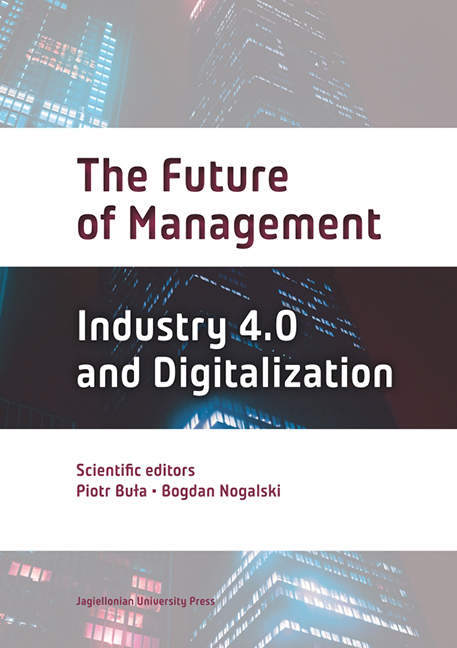Book contents
- Frontmatter
- Contents
- Preface
- Industry 4.0: Social Impacts and Operations Management Challenges
- Business Model Changes in the Presence of Challenges Brought by Industry 4.0
- Communication in Traditional and Network Organisation: Transformation
- Consequences of the Fourth Industrial Revolution in Social and Economic Development in the 21st Century
- Ideology, Trust, and Spirituality: A Framework for Management Control Research in the Era of Industry 4.0
- Renewable Energy through Industry 4.0 on the Example of Photovoltaic Development in Selected European Countries
- Employee Loyalty in the ICT Sector as a Challenge for Building Industry 4.0
- The Importance of Flexibility of Human, Tangible and Intangible Resources in Selected Production Entrepreneurships: Results of Empirical Research
- Challenges Posed for Universities by the Industry 4.0 Environment
- Big Data in Managing Marketing Communication
- Mathematical Risk Assessment Method in the Implementation of Logistic Processes
- Management and Digitisation
- Branding of Time as a New Direction in Tomorrow’s Management
- The Future of Branding
Mathematical Risk Assessment Method in the Implementation of Logistic Processes
Published online by Cambridge University Press: 16 November 2021
- Frontmatter
- Contents
- Preface
- Industry 4.0: Social Impacts and Operations Management Challenges
- Business Model Changes in the Presence of Challenges Brought by Industry 4.0
- Communication in Traditional and Network Organisation: Transformation
- Consequences of the Fourth Industrial Revolution in Social and Economic Development in the 21st Century
- Ideology, Trust, and Spirituality: A Framework for Management Control Research in the Era of Industry 4.0
- Renewable Energy through Industry 4.0 on the Example of Photovoltaic Development in Selected European Countries
- Employee Loyalty in the ICT Sector as a Challenge for Building Industry 4.0
- The Importance of Flexibility of Human, Tangible and Intangible Resources in Selected Production Entrepreneurships: Results of Empirical Research
- Challenges Posed for Universities by the Industry 4.0 Environment
- Big Data in Managing Marketing Communication
- Mathematical Risk Assessment Method in the Implementation of Logistic Processes
- Management and Digitisation
- Branding of Time as a New Direction in Tomorrow’s Management
- The Future of Branding
Summary
Abstract
Organisations providing international transportation, shipping and forwarding services are exposed to risk in every stage of making business whether it is recognised and managed, addressed in a cursory manner, or altogether ignored. In order to understand the risk that exists, companies can proactively assess the probability and impact of risk in advance, or reactively discover risk after a detrimental event occurs. Operations in the logistics process are subject to the risk of disruptions that enterprises try to minimise. The purpose of this study is to explore, analyse, and derive common themes on mathematical risk assessment techniques. The article presents the application of this method in the domain of international freight wheeled transport. Assessing risk, including appraising its likelihood of occurrence, exposure, likely triggers, and likely loss, is a critical step in managing the risk inherent in this type of companies. Findings from this research indicate that organisations can assess the risk with simple and affordable techniques.
Keywords: risk management in logistics processes, logistics process, mathematical risk assessment method, risk, risk concept, logistics
Introduction
The new landscape of the 21st century, with unparalleled advancements and growth, is fraught with a variety of hazards and risks. As multinational companies operate across borderless and timeless dimensions of the international marketplace, coupled with rapid transportation systems where nothing is more certain than a change in the ecosystems, the risk is much higher than it used to be. Every organisation needs to obtain goods and services in order to carry out its objectives and goals. In the European market for land transport of cargo, the most important role is played by shippers who choose road carriers to meet the requirements of the market and customers. The choice of road transport services is not limited only by the advantages of this type of transport, but also by the very low operational and commercial attractiveness of alternative services in this field. Although the European Union's transport policy is aimed at preventing the excessive development of road transport, in order to eliminate the negative impact on the natural environment, so far in Western Europe there is no prospect of limiting the place of road transport below 65%.
- Type
- Chapter
- Information
- The Future of ManagementVolume Two: Industry 4.0 and Digitalization, pp. 161 - 177Publisher: Jagiellonian University PressPrint publication year: 2022



